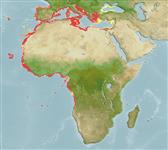Environment: milieu / climate zone / depth range / distribution range
экология
морской демерсальный; пределы глубины 15 - 400 m (Ref. 26999). Subtropical; 45°N - 15°S, 26°W - 36°E
Eastern Atlantic: Mediterranean and the Adriatic Sea (Ref. 12382); Mauritania to Angola, including Madeira, Cape Verde and the Canary Islands (Ref. 5979).
Length at first maturity / Size / Вес / Возраст
Maturity: Lm 20.4 range ? - ? cm
Max length : 45.0 cm TL самец/пол неопределен; (Ref. 27584); common length : 13.0 cm TL самец/пол неопределен; (Ref. 3397); наибольший вес (опубликованные данные): 700.00 g (Ref. 27584); наибольший возраст (опубликованны данные): 6 годы (Ref. 127561)
Краткое описание
определительные ключи | морфология | морфометрия
членистые (мягкие) лучи спинного плавника (общее число) : 85 - 95; членистые (мягкие) лучи анального плавника: 63 - 73. The scales on the eyed side are ctenoid and cycloid on the blind side. The inter-orbital width is much wider in males. The upper pectoral fin rays are not prolonged. The subspecies in the Mediterranean and African coast, P. podas has 75-86 lateral line scales, with 13-20 scales making up the curved portion. Its eyed side has alight brown color, bearing darker spots. The subspecies in Madeira and the Canaries, B. p. maderensis, has 88-91 lateral line scales, with 20-21 on the lateral line curve. Its eyed side appears dark brown to dark violet and seldom spotted.
Found in shallow waters, over sandy and muddy bottoms of the continental plateau (Ref. 5377, 12382). Feeds on benthic small fishes and invertebrates. Reproduction occurs between May and August. Small individuals adapt well in aquariums but require sufficient bottom areas (Ref. 12382).
Aldebert, Y., M. Desoutter and J.-C. Quéro, 1990. Bothidae. p. 1027-1036. In J.C. Quero, J.C. Hureau, C. Karrer, A. Post and L. Saldanha (eds.) Check-list of the fishes of the eastern tropical Atlantic (CLOFETA). JNICT, Lisbon; SEI, Paris; and UNESCO, Paris. Vol. 2. (Ref. 5979)
Статус Красного Списка МСОП (Ref. 130435: Version 2024-1)
Угроза для людей
Harmless
Использование человеком
рыболовство: коммерческий; аквариум: коммерческий
дополнительная информация
инструменты
Специальные отчеты
Скачать в формате XML
ресурсы в Интернет
Estimates based on models
Preferred temperature (Ref.
123201): 13 - 17.6, mean 15.1 °C (based on 199 cells).
Phylogenetic diversity index (Ref.
82804): PD
50 = 0.5000 [Uniqueness, from 0.5 = low to 2.0 = high].
Bayesian length-weight: a=0.00891 (0.00698 - 0.01137), b=3.04 (2.98 - 3.10), in cm total length, based on LWR estimates for this species (Ref.
93245).
Trophic level (Ref.
69278): 3.4 ±0.4 se; based on diet studies.
устойчивость к внешним воздействиям (Ref.
120179): средний (среднего размера), минимальное время удвоения популяции 1.4-4.4 года (K=0.43).
Fishing Vulnerability (Ref.
59153): Low to moderate vulnerability (35 of 100).
Nutrients (Ref.
124155): Calcium = 68.8 [28.8, 130.4] mg/100g; Iron = 0.851 [0.417, 1.517] mg/100g; Protein = 17.9 [16.6, 19.3] %; Omega3 = 0.212 [0.112, 0.389] g/100g; Selenium = 37.7 [18.6, 80.9] μg/100g; VitaminA = 9.51 [2.40, 36.37] μg/100g; Zinc = 0.65 [0.44, 0.94] mg/100g (wet weight);
